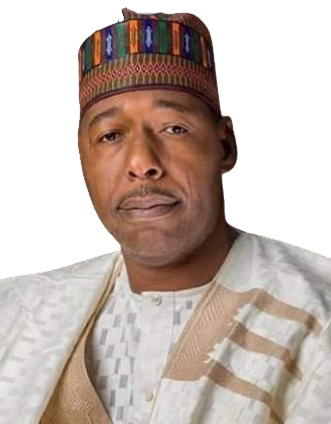By: Abdullahi Inuwa
In the ever-shifting landscape of Nigerian politics, one figure continues to draw both admiration and comparisons to a national icon—Governor Babagana Umara Zulum of Borno State. For many observers and citizens alike, Zulum is emerging as a true photocopy of Nigeria’s former President, Muhammadu Buhari—a man defined by discipline, integrity, courage, and an unshakable resolve to serve the nation with honesty.
Though their political paths began in different eras, the striking similarities between Zulum and Buhari are impossible to ignore. From his austere lifestyle to his unrelenting battle against corruption, insecurity, and poverty, Zulum embodies the spirit of Buhari—not just in words, but in action.
Like Buhari, Zulum is known for his personal discipline and simplicity. He drives himself to inspect projects unannounced, travels with minimal security, and often declines protocol. In a system where political leaders are often surrounded by excessive luxury and fanfare, Zulum, like Buhari in his early military days, remains grounded. His official convoys are modest, his public conduct measured, and his expectations for civil servants clear: work hard, serve the people, and stay clean.
His refusal to live extravagantly in a region grappling with poverty and conflict is reminiscent of Buhari’s own frugality—earning Zulum praise as a people’s governor, a servant-leader cut from the same disciplined cloth.
Perhaps the most powerful parallel between Zulum and Buhari is their unwavering stance against insecurity. While Buhari, as a former military head of state and later president, battled insurgency on a national scale, Zulum is on the frontlines in Borno—Nigeria’s epicenter of Boko Haram insurgency.
Despite facing multiple assassination attempts, Zulum continues to personally visit IDP camps, liberated communities, and dangerous terrains that most politicians avoid. He supervises humanitarian distributions, inspects security outposts, and speaks directly to displaced persons and community leaders. Just as Buhari promised to “lead from the front” during military campaigns, Zulum leads from the ground—shoulder to shoulder with his people.
Buhari’s anti-corruption reputation preceded him, earning him the moniker “Mai Gaskiya” (The Honest One) in Northern Nigeria. Zulum has adopted this same stance with vigor. Under his administration, contractors have been blacklisted for substandard work, officials sacked for incompetence, and ghost workers exposed. He champions transparency in procurement, civil service reforms, and digitalized payments to block leakages.
His personal motto? “We must do the right thing, even if it costs us politically.” That echoes Buhari’s own belief that governance should not be a business venture, but a sacred trust.
Just as Buhari placed high value on respecting constitutional authority and building strong institutions, Zulum has built his administration around the supremacy of due process. He does not interfere in court rulings or traditional institutions. In fact, he often consults elders, community leaders, and religious bodies to foster peace and policy inclusiveness.
His respect for local institutions is evident in how he empowers district heads, school principals, and local government chairmen with direct access and responsibility—a page borrowed straight from Buhari’s decentralized leadership playbook.
Under Zulum’s stewardship, Borno has witnessed one of the most aggressive post-conflict reconstructions in Nigeria. Over 300 schools have been rebuilt, over 6,000 classrooms furnished, and tens of thousands of youths enrolled in vocational and technical programs. Roads, hospitals, houses, and civic centers have sprung up across once-abandoned towns.
It mirrors Buhari’s own dedication to rebuilding the Northeast through the Presidential Committee on the North East Initiative (PCNI)—but Zulum is delivering tangible results with speed and accountability that has stunned even his critics.
More than anything else, what binds Zulum and Buhari is their deep love for Nigeria and a rare breed of patriotism. Neither seeks opulence, ethnic supremacy, nor political control for personal gain. Zulum has rejected calls to run for national office, focusing instead on completing his mission in Borno.
Similarly, Buhari, even in retirement, has refused to meddle in national politics, opting to live quietly on his farm in Daura. They both represent a type of leadership that prioritizes legacy over popularity, service over self, and nationhood over partisanship.
Nigerians from all walks of life—traditional rulers, religious leaders, civil servants, and youth groups—continue to praise Zulum for his Buhari-like values. Some have even dubbed him “Buhari of Borno”, a title that carries weight in Northern political culture.
In many ways, Zulum is becoming what Buhari once was in his earlier days—a symbol of hope, discipline, and patriotic sacrifice. As Nigeria navigates complex security and economic challenges, many are beginning to ask: Could Zulum be the model for Nigeria’s future leadership?
While no two leaders are ever exactly alike, Governor Babagana Umara Zulum stands as a true photocopy of former President Muhammadu Buhari in principle, in passion, and in performance. His leadership has rekindled hope in the North East and earned him national respect.
In a time where integrity in public office is rare, Zulum reminds Nigeria—and the world—that old-school values still have a place in modern governance.
He is not just walking in Buhari’s footsteps—he is blazing a path of his own, with Buhari’s ideals as his compass.
Abdullahi Inuwa Social Commentator ainuwa303@gmail.com




